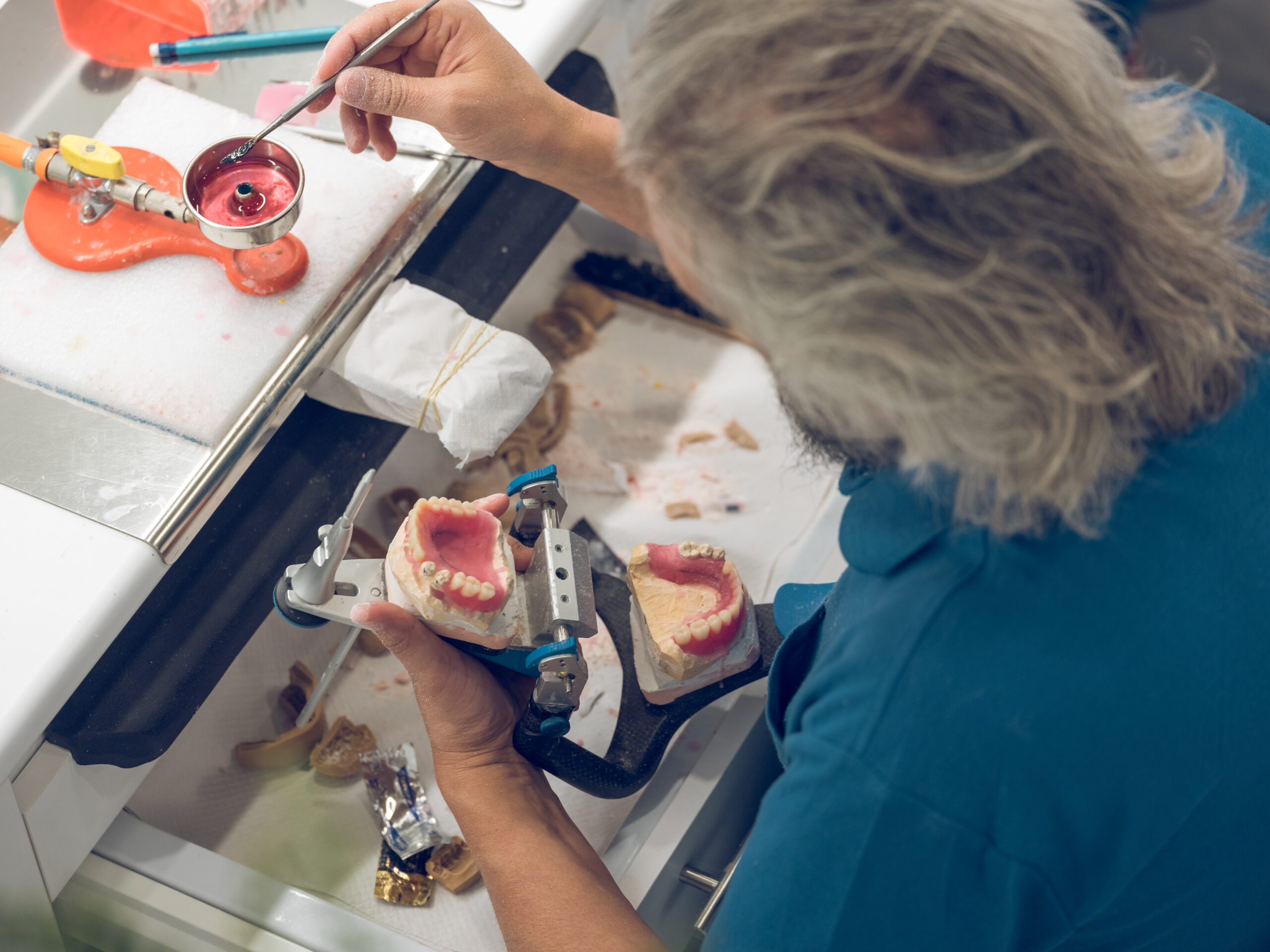You or a loved one may have questions about how Medicaid can help cover the cost of dentures. Understanding the ins and outs of Medicaid denture fabrication can make all the difference in receiving high-quality, long-lasting tooth replacements that meet your specific oral health needs. By exploring how dentures are made, how Medicaid coverage works, and what you can expect from a reputable practice like Vivid Dental Raleigh, you can feel confident about regaining a healthy, functional smile. Below, we break down key aspects of denture creation and how you can navigate Medicaid’s requirements with ease.
Explore Medicaid denture basics
Medicaid is a joint federal and state program that offers health coverage to eligible individuals, including children, pregnant women, and people with disabilities. However, Medicaid’s dental benefits can vary significantly by state, especially for adults. While federal law requires children on Medicaid to receive dental services (including help with tooth replacements), adult coverage largely depends on your specific state’s regulations. Some states provide robust benefits for dentures, while others maintain more limited offerings.
Regardless of where you live, dentures are considered an effective solution for individuals who have lost multiple teeth or even all of their teeth. Replacing missing teeth is crucial for oral function, facial structure support, and general comfort. Here are some helpful points to consider:
- Each state can develop its own dental periodicity schedule for patients, often in consultation with recognized dental organizations (Medicaid.gov).
- When it comes to adult coverage, some states fully cover dentures, while others only partially pay for them or attach specific requirements such as prior authorization.
- Medicaid typically covers a wide array of individuals but has specific rules for eligibility, such as income thresholds and qualifying categories (KFF).
- In certain states, including Idaho, Medicaid explicitly includes dentures in dental coverage, often permitting replacements every five to seven years (Newsmiledentures.com).
When you connect with a Medicaid-accepted dentist, you can discuss treatment plans that suit your particular situation. In some cases, you may need additional restorative services before moving forward with denture placement. If that’s the case, procedures like a medicaid tooth extraction service or medicaid root canal therapy might be part of your overall plan.
It’s important to review your state’s Medicaid guidelines or talk directly to your dental office about your coverage options. A skilled practice will guide you step by step, from your initial consultation to final placement, so you can rest assured that the denture process stays on track, remains affordable, and supports long-term oral health.
Understand the fabrication process
Designing and manufacturing dentures involves a number of steps to transform impressions of your mouth into fully functional artificial teeth. This journey might seem complex, but a supportive dental team can guide you through every phase. Denture fabrication typically unfolds in these major stages:
Initial consultation
The first step is scheduling an appointment with your dentist. During this visit, you will:
- Discuss your medical and dental history: Your dentist will examine your mouth, ask about your oral health background, and note any specific needs that might affect the denture design.
- Review coverage and eligibility: You will confirm that your situation fits your state’s Medicaid guidelines, possibly verifying that dentures are medically necessary and that you meet any preauthorization requirements. If needed, you can get more details from medicaid eligibility guidance.
- Develop a comprehensive plan: Your dentist will outline a plan for extractions, periodontal care, or other preliminary procedures to ensure your mouth is ready for dentures.
Impressions and materials
Once your oral health is stable and extractions (if necessary) are complete, the dentist will take an impression of your mouth. This mold captures the exact shape of your gums so that your dentures can be precise and comfortable. The impressions will guide the lab in designing the prosthesis.
Modern dentures can be made from a range of materials. Some people opt for acrylic, while others prefer a hybrid approach involving metal frameworks. The decision comes down to Medicaid coverage, your unique oral health needs, and any aesthetic preferences you might have. The lab then uses these specifications to create a base and set artificial teeth or prosthetic components in place.
Fitting and adjustments
Your dentist will schedule a follow-up to check the initial fit of the trial denture. You can then give feedback on comfort, bite alignment, and appearance. Typically, you’ll try your dentures with a wax base or an interim model in your mouth to ensure there are no major pressure points or alignment problems.
After adjustments, your final denture is processed and polished. Your dentist will then place the completed dentures, ensuring that bite, comfort, and aesthetics all meet your expectations. You’ll also learn essential cleaning and maintenance tips, along with how to handle common issues like mild irritation or tight spots.
Recognize coverage considerations
Because the coverage rules vary, a strong understanding of Medicaid’s provisions matters if you want to avoid last-minute surprises about costs, materials, or additional procedures. Being prepared will help you discuss all aspects of your plan with your dentist, clarify any out-of-pocket expenses, and confirm which services fall under Medicaid’s umbrella.
Adult coverage and state differences
Under federal law, children enrolled in Medicaid receive comprehensive dental benefits. Adults, however, do not have the same mandated coverage. While some states offer robust options for removable dentures, partial dentures, and repairs, others might limit coverage to medically necessary procedures. If you live in a state that has expanded adult benefits, you could benefit from more extensive denture services, ranging from basic replacements to higher-end solutions like implant-supported dentures.
Working with your Medicaid plan
When you work directly with your Medicaid plan, always check for:
- Preauthorization requirements: Some states demand documented proof that dentures are needed. This may include x-rays, oral examinations, or notes explaining the medical necessity of tooth replacement.
- Replacement intervals: Many states, including Idaho, acknowledge that dentures wear over time, allowing for a replacement every five to seven years (Newsmiledentures.com). If you have unusual wear and tear, it’s possible for Medicaid to allow an earlier replacement.
- Additional procedures: Dentures typically require a stable foundation. If you need extensive gum treatment, tooth extractions, or bone shaping, Medicaid might or might not cover these services. Talk to your dentist or contact your plan to confirm coverage.
Potential out-of-pocket expenses
Even if your Medicaid plan covers much of the denture process, you should be aware of possible out-of-pocket expenses. These can include:
- Upgraded materials: You might opt for premium dentures, heavier acrylic bases, or sophisticated designs that aren’t fully covered by Medicaid.
- Follow-up visits: Basic denture revisions or repairs might be included, but extensive adjustments, new liners, or advanced procedures could trigger extra fees.
- Lab costs: Depending on your dental office’s arrangement with the lab, lab fees might or might not be included in your coverage.
Before committing to a treatment plan, ask your dental team for a detailed outline of both covered and uncovered expenses. Clear communication helps you avoid billing surprises later, so you can focus on getting dentures that fit well and last.
Engage in best maintenance practices
Once you receive your new dentures, staying consistent with daily care routines is a key part of ensuring long-term success. By properly maintaining your dentures and following up with your dentist, you can enjoy an attractive smile and minimized risk of oral health issues.
Daily cleaning routine
Just like natural teeth, dentures should be cleaned thoroughly every day:
- Brush and rinse them: Use a soft-bristle denture brush or gentle toothbrush to remove food particles. Avoid harsh toothpaste or hot water, as these can damage the denture’s surface.
- Use specialized cleaners: Many denture-friendly solutions exist, such as tablets or cleaning soaks that can help remove stains and freshen your dentures.
- Care for your gums: Clean and massage your gums with a soft washcloth or soft-bristle brush every day to reduce plaque and promote gum health. This step helps prevent soreness or infections under the denture.
Handling repairs or adjustments
Despite durable materials, dentures can break or wear out through everyday use. If you notice any distortion in bite or cracks in the base, contact your dentist immediately. Never attempt to fix dentures on your own, as unprofessional adhesive solutions can worsen the problem.
If your situation calls for a quick fix or urgent care, you can arrange a medicaid emergency appointment. This ensures that you receive timely assistance if your denture breaks unexpectedly, causing discomfort or making it impossible to eat properly.
Throughout your coverage, your dentist can also help with re-lining or re-basing the dentures whenever needed. As your gum ridge shrinks or changes over time, you may need slight modifications to maintain a snug fit. A proactive approach to repairs and adjustments ensures that you continue enjoying your dentures without major disruption to your daily life.
Choose Vivid Dental Raleigh
You deserve a dentist who understands the unique challenges of replacing missing teeth and can guide you through every aspect of Medicaid coverage. Vivid Dental Raleigh is committed to providing you with high-tech, aesthetic-focused dentistry, whether you need a standard replacement or more intricate solutions. Our empathetic, supportive environment provides a stress-free experience from start to finish.
High-tech, aesthetic-focused care
At Vivid Dental Raleigh, we use modern techniques and advanced materials, ensuring that each denture is precise, stable, and natural-looking. Our high-tech approach includes digital impressions and advanced scanning equipment that reduce discomfort and the time you spend in the chair. By merging technology with artistry, we deliver dentures that are not only functional but also aesthetically pleasing.
We also understand that every individual’s smile is unique. Dentures can be crafted to mimic your natural gum color and tooth shape, helping you maintain a confident appearance. You can discuss optional features like porcelain-like finishes or specialized metal frameworks that reinforce stability while maintaining a lightweight feel.
Tailored approach to coverage
Navigating Medicaid’s guidelines can feel overwhelming, but our dedicated team simplifies the process by clarifying your coverage upfront. We can help you connect with medicaid eligibility guidance resources or, if needed, prepare any documentation required for preauthorization. If you have questions about whether partial or complete dentures are right for you, consider scheduling a medicaid partial denture service consultation to explore options for replacing only the teeth you’ve lost.
Just as importantly, we never compromise on patient care regardless of your coverage plan. Our practice prioritizes cohesive, integrated services. For instance, if you need prior restorative treatments such as a medicaid broken tooth repair to stabilize your mouth before denture placement, we can incorporate that seamlessly into your treatment plan.
Commitment to a supportive environment
We believe in an empathetic approach that respects the unique hurdles you might face when seeking treatment. At Vivid Dental Raleigh, we:
- Provide a welcoming atmosphere: You can feel at home in our practice as we encourage you to discuss any concerns or anxieties.
- Emphasize patient education: Understanding each step of your denture journey fosters trust, reduces stress, and leads to better outcomes.
- Offer comprehensive services: Beyond dentures, we cover a wide range of dental solutions to maintain your smile, from medicaid preventive dental care to urgent interventions like medicaid emergency dental care.
We aim to ensure that you or a loved one receives the support necessary for confident, lasting results. By merging high-tech innovation with a gentle touch, our team delivers care that embraces both practicality and comfort.
Explore frequently asked questions
Below are answers to five of the most common questions about Medicaid coverage of dentures. By clarifying these points, you’ll gain valuable insight into how to move forward with your denture journey.
1. Does every state’s Medicaid program cover dentures for adults?
Not necessarily. Federal law mandates comprehensive dental services for children, but adult coverage varies by state. Some states offer robust denture benefits, while others have stricter policies. Check your state’s specific guidelines or consult your dentist about navigating Medicaid coverage for dentures.
2. How often can I have my dentures replaced under Medicaid?
Many states require a waiting period of five to seven years before they’ll pay for a new set of dentures, though exceptions may exist for damage from accidental trauma or significant changes in the shape of your gums. Confirm with your state Medicaid office to see what applies to your situation.
3. Can I get a higher-end denture design fully covered by Medicaid?
Advanced materials or implant-supported dentures might not be fully covered. You may be responsible for some out-of-pocket costs if you choose upgraded denture solutions, such as those anchored by implants or those including specialized porcelain teeth. However, your standard denture may qualify for full or near-full coverage if it meets medical necessity criteria.
4. If I need dental extractions or oral surgery before getting dentures, will Medicaid pay for those procedures?
In many cases, yes, if the extractions or surgery are considered medically necessary to prepare your mouth for dentures. However, coverage depends on each state’s Medicaid guidelines. Always confirm in advance, and if you need a specialist procedure, you can look into options such as a medicaid oral surgery appointment.
5. Could my dentures be covered if they require fixing later on?
Generally, Medicaid will help cover denture repairs if the issue stems from normal wear and tear. Severely damaged dentures may need replacement if repairs are deemed insufficient. If you are experiencing any discomfort or breakage, speak with your dentist as soon as possible for advice on potential coverage.
By taking advantage of Medicaid denture fabrication, you can restore your ability to eat comfortably and speak with confidence, all while supporting proper jaw alignment and overall gum health. Because Medicaid dental policies differ by state, contact our friendly team at Vivid Dental Raleigh for guidance on how to maximize your benefits. We strive to make every step of the denture journey transparent, supportive, and tailored to your unique needs, ensuring that you or a loved one receives the care, empathy, and comprehensive attention you deserve. Whether you decide on basic or advanced dentures, rest assured that an experienced, compassionate team is here to help you unlock high-quality care and reclaim a vibrant, healthy smile.










